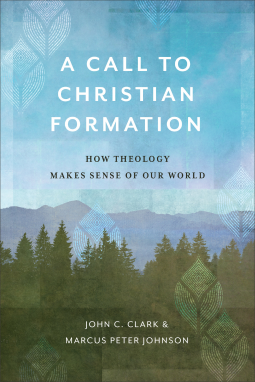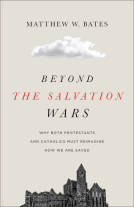
A Call to Christian Formation
How Theology Makes Sense of Our World
by John C. Clark; Marcus Peter Johnson
This title was previously available on NetGalley and is now archived.
Send NetGalley books directly to your Kindle or Kindle app
1
To read on a Kindle or Kindle app, please add kindle@netgalley.com as an approved email address to receive files in your Amazon account. Click here for step-by-step instructions.
2
Also find your Kindle email address within your Amazon account, and enter it here.
Pub Date 20 Jul 2021 | Archive Date 20 Sep 2021
Baker Academic & Brazos Press | Baker Academic
Talking about this book? Use #ACalltoChristianFormation #NetGalley. More hashtag tips!
Description
This book shows that theology is both integrally related to formation in Jesus Christ and shapes our understanding of the world. Christian formation is incomplete and impossible without theological formation, because Christ transforms our hearts and minds, attuning them to the reality of God. As the authors explore the deep connections between theology and the life of the Christian, they emphasize Christian formation as a defining feature of the church, arguing that theology must be integrally connected to the church's traditions and practices.
Advance Praise
“This presentation of the foundational role of orthodox, biblical theology in daily life and work will be of great encouragement to students and pastors, as well as lay persons who are serious about building their lives on the unshakeable foundation laid down by the Word of God in Jesus Christ. I admire the authors’ forthright affirmation of the concrete, life-giving nature of theological study, graciously expounded here for the well-being of the church and for the daily lives of serious disciples of Jesus. He is honored here as the Savior and Lord of the mind as well as the bodily life and destiny of all who seek him. The apostle Paul urged that every thought be taken captive to obey Christ and him alone. Clark and Johnson have sought to do just that.”—Fleming Rutledge, author of The Crucifixion: Understanding the Death of Jesus Christ
“This wonderful book offers a clarion call to make the knowledge of God the most important thing in our lives, the thing we long for, delight in, pursue, and prioritize above all else—and use to interpret and apply everything else in our lives as well. It offers a call, in other words, to recover the significance of theology once again in an age when most Christians pay lip service to God without knowing much about him. I pray that it will captivate the souls of many readers, yielding a renaissance of interest in pursuing God among everyday people in the context of the church. May real, genuine growth in our knowledge of the Lord renew our minds, shape our thoughts, and fuel our lives.”—Douglas A. Sweeney, dean and professor of divinity, Beeson Divinity School, Samford University
“Being called to formation means nothing less than being called to Christ. That’s the basic premise of A Call to Christian Formation. From start to finish, this book invites us to share in the mind of Christ. It’s when the whole of us is transformed by the whole of him that we learn to do our theology well. Bold and unapologetic, Clark and Johnson ward off all wanderlust—away from God in Christ, away from the church and her liturgy, away from mystery and paradox. Grounded in Scripture and conversant with ecumenical thought, this book powerfully reminds us that the Christ-reality is the only place where true communion is found.”—Hans Boersma, Saint Benedict Servants of Christ Chair in Ascetical Theology, Nashotah House Theological Seminary
“Clark and Johnson issue an invitation to theology for those who may not realize the adventure they’re missing. Their book offers an introduction to the dazzling mystery of knowing God in Christ. It has something to teach about why the doctrine of the Trinity matters, why there is no Christian life without the church, how liturgies form us, and what it means to hope for the kingdom of God.”—Phillip Cary, professor of philosophy, Eastern University
“For evangelicals and Protestants wanting to know what theology is and hungering for mystery and liturgy and sacrament in the historical church, this is a beautifully written guide to going further up and further in.”—Gerald R. McDermott, retired Anglican Chair, Beeson Divinity School, Samford University; author of Everyday Glory
“Clark and Johnson helpfully remind us that theology matters not because we need to fill our heads with abstract philosophical ideas but because it is our way of responding to the reality of the Triune God, who has called us to enter into his life and purposes. Let this volume take you back to the heart of the formative nature of true theology—fostering our worship of God and letting his reality reshape us in his goodness and truth.”—Kelly M. Kapic, professor of theological studies, Covenant College
“If the church is to succeed in forming people who look like Jesus, it will need a theology that is up to the task. In this wonderful introduction, Clark and Johnson show us that theology is not the dusty domain of academic specialists but real, saving, and transforming knowledge of the living God given by Christ to his church for a purpose: the edification and maturity of God’s people into the image of Christ.”—Joel Scandrett, assistant professor of historical theology, Trinity School for Ministry; editor of To Be a Christian: An Anglican Catechism
Available Editions
| EDITION | Other Format |
| ISBN | 9781540960689 |
| PRICE | US$24.00 (USD) |
| PAGES | 224 |
Featured Reviews
In this book Clark and Johnson argue powerfully that robust theology, rooted in Scripture and the Great Tradition, is vital to Christian formation. Sadly, theology has fallen on hard times in society and unfortunately, also in the modern church. Drawing on Scripture and the voices of theologians from the early church right through to contemporary times, the authors show the relevance of theology in forming the church and the individual believer. In a time when experience is elevated over Scripture and Tradition, this is important reading.
One of my favourite quotes "...make no mistake: theological formation is the only antidote against being conformed and deformed by the world, the only alternative to being catechized and liturgized by the spirit of the age and its dominant ways of thinking, speaking, and acting."
Stop me if you’ve heard this one before:
Christians shouldn’t worry about theology.
I’m not one to keep track of times I’ve heard clichés over the years, but I think it’s safe to say if I had a nickel for every time I heard this phrase, or a variation, I’d be retired and riding jet skis in Cabo. Ultimately, it seems to stem from “observational evidence:” witnessing people who seem to be up in their ivory towers, divorced from reality and the church; people who went to seminary to become a pastor and walked away distrusting everything the Bible says.
To be fair, there is truth in these concerns. For the former, I remember the first time I ever read anything by John Dominic Crossan, How to Read the Bible and Still Be a Christian, and walking away absolutely perplexed by how this would encourage anyone to continue walking in the faith. As for the latter, I had my moments throughout my eight years of schooling where I deeply questioned the truthfulness of the Bible, but thankfully, the Lord did not give up on me, even when I wanted to throw it all away.
Do these examples prove theology is not important? Far from it. In fact, I think this proves why theology is important, because without a proper framework to operate in the world, we will be cast to and fro by every competing culture and ideology of the day. Which is why I believe books like A Call to Christian Formation: How Theology Makes Sense of Our World are so necessary: what better way to combat the lies of the world than to study and, more vitally, be formed by “the truth and reality found in [Jesus]”?
Authors Marcus Peter Johnson and John C. Clark break up their book into eight sections: an introduction to the study of theology; six sections covering different elements of Christian doctrine, including ecclesiology, liturgy, and eschatology; and a conclusion containing “six theses on the character and calling of theology.” While A Call to Christian Formation does discuss orthodox theology, such as the Trinity (“The doctrine of the Trinity is not an invention of the church; it is the expression of a divine experience that birthed the church into existence in the first place.”), the focus is more on why we are called to study theology. Human beings base their lives, including their identities, on perceptions of truth, so it only makes sense Christians should take theology seriously:
If theology claims to know the almighty God, who is himself the foundation of all human knowledge, then theology is either fundamental or fraudulent. If reality does not reside in knowledge of the God of truth, then reality can, and indeed must, be found elsewhere. Conversely, if God is the source and ground of all truth, then truth can, indeed must, be found nowhere else than in God, the ground and context of all human knowing. Either way, nothing less or other than reality hangs in the balance.
More than simply knowing truth, we are called to worship truth, to share in communion with truth, and how we worship and commune will reflect in how we live. Drawing off the maxim lex orandi, lex credenda, “The law of praying determines the law of believing,” when we understand why we worship, why we believe what we believe, it inevitably forms us into more beautiful image bearers of our Savior. And this is the genius of this book: it goes from laying a foundation of what theology is, then discussing who Jesus is, what the Trinity is, why the body of Christ is important, and how these elements influence how we worship.
Although my notes might indicate otherwise, as it was my least notated chapter, I think the most important chapter is what follows: “The Postulate of Paradox.” One of the hardest elements of the Christian faith can be summed up in a single phrase from the Book of Common Prayer: “Therefore, we proclaim the mystery of faith…” Nothing about the Christian religion jives with contemporary reason and rationale. No matter how often or hard we try to make it otherwise, whether it’s the Trinity or the fact through death we are made alive, Christianity is paradoxical. And, as the authors point out, “Paradox … is the way that Christians allow the mystery of Christ to shape our reason in accordance with that mystery.” Instead of letting our perceptions of the world dictate how we see the Lord, we allow who he is to reveal what reality truly is.
Why this book works is because even if there are some $100 words, like sopilistic, A Call to Christian Formation is a book all orthodox Christians can benefit from. In fact, I could see A Call to Christian Formation being helpful for those who have that desire to believe, but struggle with accepting some of the more paradoxical and illogical elements of the faith. Whichever way you lean, Johnson and Clark make it clear Jesus is at the center of their writing, that their goal is to write a book that actually benefits and strengthens the church, which is why I can endorse this release with zero reservations.
(Oh, and there is an abundance of Alexander Schmemann quotes. Every Christian needs to read For the Life of the World. Just saying.)
Soli Deo Gloria.






